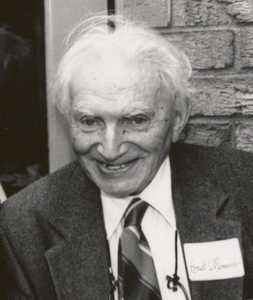
Ernst Manasse
*Ernst Manasse was born on this date in 1908. He was a white Jewish German American philosopher and classical philologist.
Ernst Moritz Manasse was born in Dramburg, Pomerania Prussia. His ancestors lived in Dramburg as early as 1813, according to local documents proving that Aron and Moses Manasseh received civil rights that year. Manasse's father, Georg Mayer Manasse, was a merchant and traded agricultural products. He was also the synagogue head of the Jewish Community of Dramburg. Manasse's mother, Clara Manasseh, came from Bublitz. Ernst had a brother Georg, and two sisters: Käte and Lena. Käte and her husband Heinrich owned a farm in East Pomerania near the Polish border.
In 1932, the German government developed a plan to enable population groups suffering from the consequences of the Great Depression to emigrate to Brazil. The Kaplan's relocated to southern Brazil and set up a coffee plantation, later a stopover for his wife Marianne on the flight from Europe to the USA. While he experienced the solidarity of non-Jewish friends and fellow citizens during the boycott of Jewish businesses, as Nazi Germany unfolded, Manasseh's mother moved to Berlin in 1936. She was able to leave for her daughter in Brazil in 1940. Six of her siblings and three of her husbands were murdered in extermination camps.
Manasse left Germany in 1935 when Nazis blocked his father's funeral procession because it included Jews and non-Jews. He settled in Italy until Mussolini announced that all non-Italian Jews would be expelled. Manasse and his wife, Marianne, left Italy in 1938 but could not secure travel visas to the same place. She and their infant son went to Brazil, and he went to Oxford University for a semester.
From England, Manasse successfully applied for a tourist visa to the United States, and as soon as he arrived, he set about finding an academic position. The Emergency Committee in Aid of Displaced Foreign Scholars declined to help Manasse because he had completed his Ph.D. just as Jews were expelled from German universities and, therefore, had never held a professorship. After a year of searching, a month before his visa expired, he was taken on by North Carolina Central University (NCCU), thanks to James E. Shepard, the university's president and founder.
Shepard offered him a position that paid just enough for the Manasse to survive and qualified him for a work visa. Shepard eventually hired three more German scholars. He was motivated by humanitarianism but recognized an unprecedented opportunity to bring world-class scholars to NCCU. Shepard's foresight was a boon to students for generations to come. That was the case at American historically black colleges and universities, where administrators saved the lives of Manasse, and 50 German Jewish scholars, who worked at many of their institutions.
"These teachers cared for us, recalled Manasse's former student Eugene Eaves, later a professor of linguistics and provost at NCCU. Manasse later reflected, "If I had not found a refuge then, I would have been arrested, deported to a Nazi concentration camp, tortured, and eventually killed." Instead, he remained on the NCCU faculty until he retired in 1973 and lived the rest of his life in Durham. Ernst Manasse died on May 13, 1997, in Durham, North Carolina.